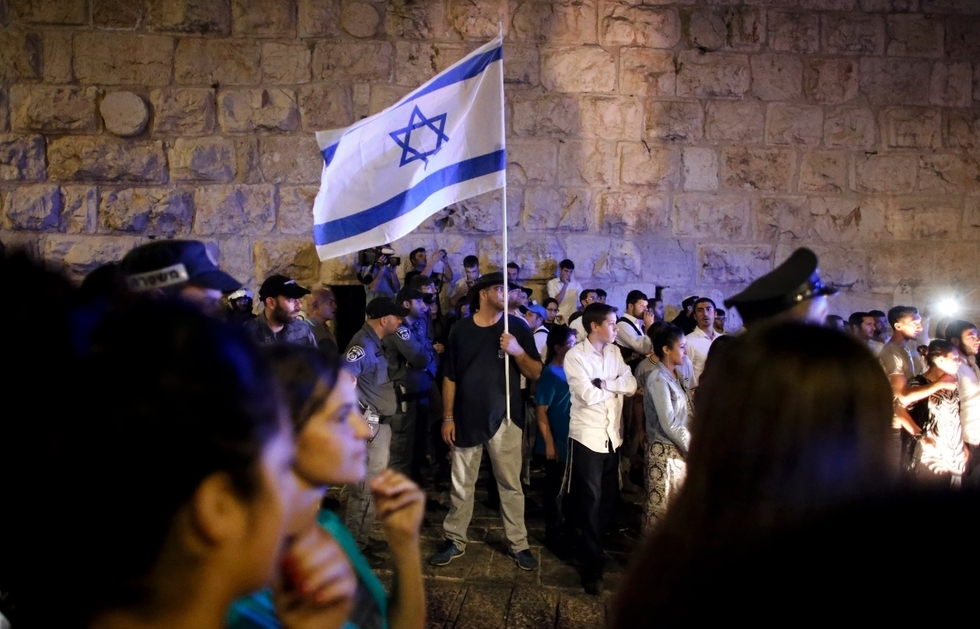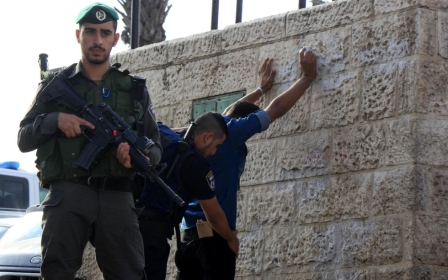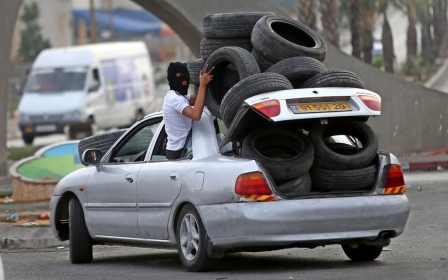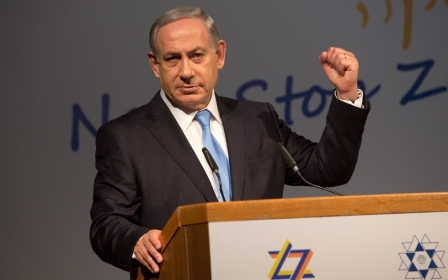The rise of anti-Palestinian hysteria

Haptom Zerhom, an Eritrean asylum seeker, had nothing to do with the Israeli-Palestinian conflict. Yet early this week he happened to be on Beersheba's central bus station in southern Israel, when a Palestinian gunman entered the place. Zerhom ran for his life, but a group of Israelis carrying guns decided, maybe because the colour of his skin, that he is the Palestinian attacker.
Zerhom was shot, fell down, but this was not the end of his ordeal. Israel security men continued shooting him while he was laying on the ground, and passers-by kicked him and pounded him with chairs and benches, cursing him and wishing him dead. Zerhom died as a result of this lynch and its perpetrators are now investigated by the police.
On Wednesday, it turned out that not only Palestinians, or a presumed Palestinian like Zerhom, fall victim to this kind of extrajudicial killings. An Israeli Jew, himself a veteran of the Israeli army, was shot dead by two soldiers in Jerusalem after confronting them for unclear reasons. The crowd around shouted "terrorist, terrorist", and the soldiers shot and killed him.
These two happy-trigger incidents certainly give credit to Palestinian claims that some, if not most, of the Palestinians shot dead or wounded after allegedly attacking Israeli civilians or soldiers since the beginning of the last wave of violence, did not carry any weapons or were shot while not posing any danger.
But the easiness in which suspected attackers are being killed and even lynched these days in Israel is an expression of a larger phenomenon. Jewish Israeli society is largely governed by collective hysteria, leading even ordinary citizens to take part in these bloody events.
The numbers themselves cannot explain this collective hysteria. Fifty Palestinians and eight Israelis, in addition to the two "mistaken identity" cases in Beersheba and Jerusalem, were killed since violence began early October. This may sound like a heavy toll, but compared to previous Israeli-Palestinian conflicts it is not. During the Second Intifada, more than 100 Israelis and 250 Palestinians were killed in March 2001 alone, the month which saw highest number of casualties. Yet even then Israel was not carried in such a wave of hatred.
This atmosphere of hate is not directed only against alleged Palestinian attackers. The Palestinian minority in Israel is subject to an almost unprecedented wave of hate crime. A bus driver was taken off his bus in Modi'in by Israeli Jews carrying guns only because he was a Palestinian. A Palestinian woman from Haifa, probably mentally ill, was documented held to the ground and kicked in her head after getting in to a verbal dispute with an Israeli Jew.
Extreme-right wing groups like Lehava (Flame) or La Familia, (fan group of Bietar Jerusalem football club) stage regular rallies in Jewish-Palestinian mixed cities like Jerusalem, Haifa or Lyd, chanting "death to the Arabs" slogans and chasing Palestinians passers-by. Many Palestinians citizens of Israel report that they are afraid to go into Jewish cities or even travel on buses.
Calls for boycott on Palestinian-held businesses were raised by prominent politicians like ex-foreign minister Avigdor Lieberman and widely followed. Nazareth, Jaffa and other Palestinian urban centres inside Israel are almost empty of Jewish customers.
"The political leadership of Lieberman, Eli Yishai (ex-interior minister) and others is fomenting anti-Arab rhetoric and are giving impetus to anti-Arab hooligans', says Ron Gerlitz, co-director of Sikui (Chance), a joint Jewish-Arab organization for the promotion of equality in Israel. "The social media is also helping to saw hate. Any post calling for 'death to the Arabs' receives tens of thousands of likes."
Gerlitz suggests that one of the reasons for this surge in hate speech and crimes is the very fact that the Palestinian minority inside Israel is getting stronger, both economically and politically. Those Jews who are afraid of losing their monopoly on power - explains Gerlitz - react with anger and violence.
While Gerlitz's generation – he was born in 1973 – grew up with the peace agreement with Egypt in 1979 and then the Oslo in 1993, the current generation grew up under the shadow of the violence of the Second Intifada and the repeated military operations against Gaza. This is the only reality he knows.
Yet there is another important element. Since the end of the Second Intifada in 2005, most Israelis accepted the assumption that the status quo – continued occupation and settlements with no real negotiations to end them - is not only possible, but also desirable. Israelis were thought to believe that even the Palestinians will eventually accept this status quo because of its alleged economics advantages.
The very fact that the violence which began three weeks ago is not an organized uprising, that any Palestinian could be the next attacker and that attack could happen anywhere, in Jerusalem as well as in Tel Aviv or the West Bank – has shattered this comfortable conviction. The calls by high officials, including the mayor of Jerusalem, for Israeli citizens to carry arms signalled that their government no longer vouches for their security and that they had to take care of themselves.
This atmosphere is leading the Jewish Israeli society into dangerous spheres. In a poll held among Jewish voters last week, 58 percent supported the idea of "voluntary transfer" of Palestinians from the West Bank. An idea one considered on the fringes of Israeli politics now entered the mainstream. "Some young Israeli Jews genuinely believe that Israel can expel the Palestinians and solve the problem", syas Gerlitz.
"(Prime Minister Binyamin) Netanyahu succeeded in convincing the Jewish society in Israel that all Arabs are against them", says Dr Thabet Abu Ras, a political geographer and co-director Abraham Fund. "Netanyahu moved from Iran to the Palestinians as the incarnation of the threat to Israel's existence. This is his last card."
Under this light it is easier to understand the seemingly incoherent remarks made by Netanyahu concerning the alleged involvement of Haj Amin al-Husseini, one of prominent Palestinian leader during World War Two, in the formation of the "final solution" for the Jews under the Nazi regime.
"Hitler didn’t want to exterminate the Jews at the time, he wanted to expel the Jews", were Netanyahu's words on Tuesday, referring to Hitler's meeting with al-Husseini in November 1941 in Berlin. "And Haj Amin al-Husseini went to Hitler and said, 'If you expel them, they'll all come here (to Palestine)'. 'So what should I do with them?' he (Hitler) asked. He (Husseini) said, 'Burn them'."
These remarks earned Netanyahu a rare multilateral criticism from all walks of Israeli Jewish society. Not only because they ran contrary to all historical evidences which prove that Hitler began planning to exterminate the Jews as early as 1923 and that prior to that meeting in November 1941 the Nazis had already killed at least half a million Jews. But because it practically absolved Hitler and the Nazi regime from their responsibility for the holocaust, turning Netanyahu into a new kind of holocaust denier.
The scene in which the German Chancellor Angela Merkel, in a joint press conference with Netanyahu, declared that the German people and its leadership where responsible of the holocaust, while Netanyahu insisted that the Shoa was really the making of the Palestinians - was certainly one the weirdest Israel, the supposed State of the Jews, had ever witnessed.
Netanyahu's image maybe tarnished as result of these strange and unfounded remarks. Yet maybe there is logic behind this madness. Netanyahu "tried to incriminate the Arabs of today by the deeds of the Arabs in the past," said Prof. Moshe Zimerman, one of the leading Israeli researchers of German history.
And after the clouds of Netanyahu's remarks will sink, his claims that the Palestinians were largely responsible for the worst crime against the Jewish people may rest behind. Such feeling will certainly help Netanyahu to convince Israelis that the Palestinians are their eternal enemies, with whom no political deal is possible. It is not difficult to understand why a growing number of Israeli Jews think that under these circumstances, transfer is just a logical solution.
- Meron Rapoport is an Israeli journalist and writer, winner of the Napoli International Prize for Journalism for an inquiry about the stealing of olive trees from their Palestinian owners. He is ex-head of the News Department in Haaertz, and now an independent journalist.
The views expressed in this article belong to the author and do not necessarily reflect the editorial policy of Middle East Eye.
Photo: Israeli extreme far-right supporters demonstrate against Palestinians at one of the gates of the Jerusalem's Old City, on 3 October, 2015 (AFP).
New MEE newsletter: Jerusalem Dispatch
Sign up to get the latest insights and analysis on Israel-Palestine, alongside Turkey Unpacked and other MEE newsletters
Middle East Eye delivers independent and unrivalled coverage and analysis of the Middle East, North Africa and beyond. To learn more about republishing this content and the associated fees, please fill out this form. More about MEE can be found here.





